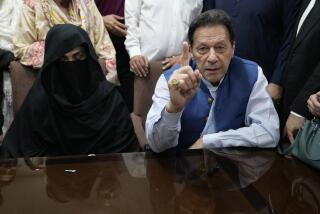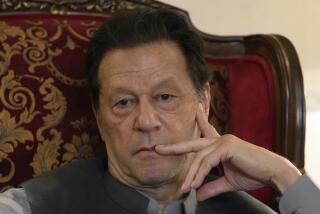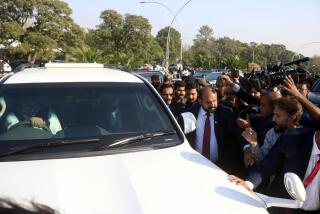Musharraf Pardons Scientist
ISLAMABAD, Pakistan — President Pervez Musharraf on Thursday pardoned Abdul Qadeer Khan, the father of Pakistan’s atomic bomb, for having illegally passed nuclear secrets to Iran, Libya and North Korea.
In announcing his action to reporters, Musharraf insisted that Pakistan’s military was not involved in the black-market sales. He also stressed that his nation’s atomic efforts -- Pakistan is the only nuclear-armed Muslim country -- would continue.
“I will ensure that there will be no rollback of our nuclear program,” Musharraf said.
Khan, a metallurgist who became a national idol by leading a top-secret program to build Pakistan’s atomic bomb, confessed to transferring nuclear technology in a televised address Wednesday. He also petitioned Musharraf for mercy.
Last month, Musharraf vowed to “treat with an iron hand” anyone found guilty of spreading nuclear weapons technology. But faced with enormous public support for Khan and the possibility that a trial could lead to further embarrassment for Pakistan, Musharraf softened his stance.
“I, as president of Pakistan, have decided to pardon Dr. A. Q. Khan, who is our national hero but has made mistakes, which is unfortunate,” Musharraf told Pakistani journalists.
He provided no details of Khan’s pardon, such as whether the scientist would have to give up any of the millions of dollars he was reported to have received for selling the technology. However, Khan will no longer be allowed to travel abroad, Musharraf said.
Many analysts had predicted that Khan would escape punishment because of his popularity and because he could implicate senior military officers in the transfers. Musharraf insisted that Khan had acted without government approval.
“We have questioned all the military personnel, including three former army chiefs and former presidents, but found that they were not involved in the nuclear proliferation, and this was done by Dr. Khan and his associates,” Musharraf said in his briefing.
In his confession, Khan made no mention of payment for the nuclear leaks and said vaguely that his activities “were based in good faith.”
Musharraf, dressed in camouflage fatigues, said Khan and those who helped him were motivated by “money, obviously. That’s the reality.”
Musharraf disclosed for the first time Thursday that the military’s Inter-Services Intelligence agency began investigating suspected leaks of nuclear arms technology in early 2001, during which the ISI raided a plane bound for North Korea. Musharraf said they plane was chartered by Khan Research Laboratories, which Khan headed. He said ISI agents found nothing on board, but he nonetheless removed Khan as chairman of the KRL weapons facility in March of that year, immediately after the raid.
U.S. intelligence sources have reported that Pakistanis aided North Korea’s nuclear weapons program in exchange for missile technology. As recently as 2002, U.S. satellites detected Pakistani military transport aircraft in North Korea, officials have said.
Pakistan’s government says no leaks of nuclear technology occurred after February 2000, when Musharraf formed the National Command Authority, a group of military commanders, Cabinet ministers and government officials that controls the country’s nuclear weapons.
Pakistani officials made the ISI’s current investigation public only in November after United Nations inspectors uncovered evidence of Pakistani involvement in Iran’s nuclear program.
Musharraf told reporters Thursday that he had tried to shield Khan, but added: “You cannot shield a hero and damage the nation.” No decision has been made on the fate of at least six other scientists still in detention, Musharraf said. They include Mohammed Farooq, once Khan’s closest aide as head of overseas procurement for the nuclear program.
At least two retired army brigadiers responsible for security at KRL and a retired major in charge of maintenance and construction at the facility also have been detained for questioning. “All the proliferation, unfortunately, was under the supervision or orders of Dr. A. Q. Khan,” Musharraf said.
Khan’s admission of responsibility did not allay concerns at the International Atomic Energy Agency or among diplomats in Vienna, where the United Nations watchdog agency is based. “Dr. Khan was not working alone,” IAEA head Mohamed ElBaradei told reporters. “Dr. Khan is the tip of the iceberg for us.”
A European diplomat expressed concerns that Khan’s black-market operation provided nuclear secrets to countries beyond Libya, Iran and North Korea. “There are more shoes to drop,” cautioned the diplomat, speaking on condition of anonymity.
Family members of detained scientists who worked under Khan say it is common knowledge among staff that military intelligence agents are constantly monitoring them to maintain tight security over the weapons program. But Musharraf said that under Khan, the KRL facilities had their own autonomous security and administrative departments.
Many Pakistanis believe that their country is being singled out because the West is laying the groundwork to disarm the only Muslim nation to have nuclear weapons. But Musharraf insisted that would not happen. “There is no pressure whatsoever from any country in this regard,” he said.
Times staff writer Watson reported from New Delhi and special correspondent Zaidi from Islamabad. Times staff writer Douglas Frantz in Vienna contributed to this report.
More to Read
Sign up for Essential California
The most important California stories and recommendations in your inbox every morning.
You may occasionally receive promotional content from the Los Angeles Times.










